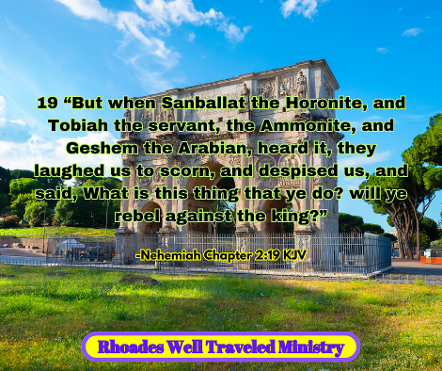GOD'S WORD
- The fascinating Story of Sanballat "I" in the Book of Nehemiah -
In the KJV Bible
April 1, 2024

Reverend Danny Rhoades
Dear Brothers and Sisters, over the course of four days, I’ve embarked on a unique journey. Today, we delve into the final story Part Four: The fascinating Story of Sanballat "I" in the Book of Nehemiah in the KJV Bible offers a captivating narrative of opposition, conflict, and intrigue within the historical context of ancient Israel. As a prominent figure in the Samaritan community during the time of Nehemiah's efforts to rebuild Jerusalem's walls, Sanballat I played a crucial role in challenging and obstructing Nehemiah's mission. This article delves into the background of Sanballat I, explores his opposition to Nehemiah's rebuilding efforts, examines the intrigues and conflicts that arose between them, delves into Sanballat I's role in the Samaritan community, and reflects on his enduring legacy in biblical history.
Before we dive into the drama surrounding Sanballat I, let's set the stage with a quick intro to the Book of Nehemiah. It's like the blueprint of a DIY project, but with more walls and fewer trips to the hardware store.
Picture a time where kingdoms were like high school cliques, and everybody wanted to be the cool kid with the best walls. Sanballat I was a player in this ancient political game, and his story intertwines with Nehemiah's like a messy soap opera plot.
When Nehemiah announced his plans for rebuilding the walls of Jerusalem, Sanballat I probably reacted like a grouchy neighbor hearing that someone is throwing a loud party next door. Cue the eye rolls and plotting.
Sanballat I wasn't one to sit back and watch someone else steal the spotlight. He cooked up schemes and obstacles to make Nehemiah's life harder than a choose-your-own-adventure game with no happy endings.
Imagine the tension of a rap battle, but instead of rhymes, it's barbed insults and power plays between Sanballat I and Nehemiah. Their clashes were like a medieval version of a reality TV show, with walls and political intrigue instead of champagne and drama.
Behind every sneaky move and plot twist, there's a motive. Sanballat I's actions were fueled by a mix of political ambition, personal grudges, and maybe a dash of envy towards Nehemiah's project management skills.
In the Samaritan community, Sanballat I was like the boss you love to hate. He held sway, made decisions, and probably had his own fan club (or maybe just a group of loyal followers who were good at stirring up trouble).
Sanballat I's antics didn't just affect Nehemiah; they had ripple effects in the Samaritan community. His choices and schemes could make or break alliances, shape the community's reputation, and probably provide enough gossip fodder to keep everyone talking for years.
Sanballat I, oh boy, what a character! If you've ever delved into the Book of Nehemiah in the KJV Bible, you've likely encountered this guy and his shenanigans. Let's take a dive into the murky waters of historical intrigue and biblical drama surrounding Sanballat I.
So, who exactly was Sanballat I? Well, according to ancient texts, Sanballat was a prominent figure during the time of Nehemiah, the cupbearer to the king of Persia. Sanballat wasn't exactly throwing Nehemiah a welcome party when he tried to rebuild the walls of Jerusalem. Nope, he was more like the party pooper who tried to sabotage the whole thing. Talk about a real buzzkill!
Now, you might be wondering, why should we care about Sanballat I and his antics? Well, his story actually serves as a cautionary tale about opposition to God's work and the importance of perseverance in the face of adversity. Just like how Sanballat tried to throw a wrench in Nehemiah's plans, we too may encounter obstacles when trying to do what's right. But hey, if Nehemiah could rebuild those walls despite Sanballat's best efforts, then we can certainly face our challenges head-on too!
Stay tuned for more biblical escapades and colorful characters that make the Good Book the page-turner that it is!
Brothers and Sisters now let's review what we just learned, from today's devotional.
First we learned that Sanballat the Horonite (also known as Sanballat I) was a Samaritan leader and an official of the Achaemenid Empire during the mid-to-late 5th century BC.
- He is best known from the Book of Nehemiah, where he emerges as one of the chief opponents of the Jewish governor Nehemiah.
- Nehemiah’s mission was to rebuild the walls of Jerusalem and carry out reforms among the Jews.
- Sanballat’s opposition to Nehemiah’s efforts makes him a central figure in this biblical account.
Second we learned that Key Conflicts and Intrigues Between Sanballat I and Nehemiah:
- Subterfuge and Nehemiah’s Stand (Verses 1-4):
- Sanballat, along with Tobiah and Geshem, saw Nehemiah’s significant progress in rebuilding the wall.
- They attempted to trick Nehemiah into leaving his post under the pretext of a meeting, but Nehemiah perceived their ill-intent and refused to abandon his work.
- False Accusations (Verses 5-9):
- Frustrated, Sanballat resorted to slander, sending a letter accusing Nehemiah of plotting rebellion against the king.
- Nehemiah unequivocally denied the accusation, recognizing it as an attempt to discourage him and his fellow builders.
- Deception within the Walls (Verses 10-14):
- Nehemiah faced deception from within when Shemaiah, a supposed ally, tried to manipulate him into hiding in the temple.
- Nehemiah rejected the advice, praying for strength and guidance.
- The Wall Completed (Verses 15-19):
- Despite these conspiracies, Nehemiah completed the Jerusalem wall in record time, a testament to God’s favor.
- Tobiah, with familial ties in Jerusalem’s nobility, continued to send letters to intimidate Nehemiah.
Third we learned that Sanballat I’s Role in the Samaritan Community and Influence on His Actions:
- Sanballat was the governor of Samaria, a region with a significant Samaritan population.
- His opposition to Nehemiah’s work stemmed from viewing it as a threat to his power.
- Sanballat mocked, threatened, and conspired with Israel’s enemies to intimidate and halt the rebuilding efforts.
- His actions represent the spiritual opposition that believers often face when doing God’s work.
In summary, Sanballat I played a pivotal role in the conflict surrounding the rebuilding of Jerusalem’s walls, and his interactions with Nehemiah reveal themes of courage, faith, and unwavering commitment to God’s work.
In conclusion, the story of Sanballat I in the Book of Nehemiah serves as a reminder of the complexities and challenges faced by individuals in positions of power and influence. Through his opposition to Nehemiah and his actions within the Samaritan community, Sanballat I leaves a lasting imprint on biblical history as a figure whose motivations and actions continue to be studied and debated. His interactions with Nehemiah shed light on the dynamics of leadership, conflict, and perseverance, offering valuable insights for readers seeking to understand the nuances of historical narratives within the sacred texts of the Bible.
After carefully reviewing the copy, it is clear that the message is emphasizing the importance of effective communication in achieving success. Communication is the key to building strong relationships, both personally and professionally. By being clear, concise, and open in our communication, we can avoid misunderstandings and conflicts, leading to better collaboration and productivity. It is essential to actively listen, ask questions, and provide feedback to ensure that our message is being received and understood. In today's fast-paced world, effective communication skills are more important than ever in navigating the complexities of our interconnected society.
Brothers and Sisters, I hope and pray that you have enjoyed and gained some great knowledge reading my devotional today on "The Fascinating Story of Sanballat "I" in the Book of Nehemiah in the KJV Bible" What roles did he play in it and why were they important" as I have researching and writing about them.
Let’s explore the fascinating stories of Mesha Stele, Hadadezer, and Sanballat I, and their significant roles in the King James Version (KJV) Bible:
Mesha Stele:
The Mesha Stele, also known as the Moabite Stone, is a crucial archaeological artifact from ancient Moab.
It was accidentally discovered in 1868 by a German missionary named F. A. Klein among the ruins of Dhiban (the biblical “Dibon”), which served as the capital of Moab.
Carved from black basalt, the stele stands about 3 feet tall and 2 feet wide.
The inscription on the Mesha Stele chronicles King Mesha of Moab’s military victories over his enemies, including Israel and possibly Judah.
The most intriguing part of the inscription is its 31st line, which refers to the “House of David”—the dynasty established by King David of the Bible.
Although the stela was damaged, new photographic evidence suggests that it indeed mentions the “House of David” and confirms this reading.
The Mesha Stele provides invaluable insights into the ancient Kingdom of Moab and its interactions with neighboring kingdoms.
Hadadezer:
Hadadezer was a powerful king mentioned in the Old Testament.
He ruled the Aramean kingdom of Zobah during the time of King David.
Hadadezer engaged in military confrontations with David, leading to intense conflicts.
David defeated Hadadezer and subdued his forces, gaining control over territories that were previously under Aramean rule.
Hadadezer’s story highlights themes of war, power dynamics, and territorial struggles in biblical history.
Sanballat I:
Sanballat the Horonite (also known as Sanballat I) was a Samaritan leader during the mid-to-late 5th century BC.
His significance lies in the Book of Nehemiah, where he emerges as one of the chief opponents of the Jewish governor Nehemiah.
Sanballat opposed Nehemiah’s mission to rebuild the walls of Jerusalem and carry out reforms among the Jews.
Their conflicts involved subterfuge, false accusations, and deception.
Sanballat’s actions represent the spiritual opposition that believers often face when doing God’s work.
His role in the Samaritan community influenced his actions against Nehemiah.
In summary, these stories reveal common themes of conflict, power struggles, and opposition to God’s purposes. Each character played a pivotal role in shaping biblical history and illustrating timeless lessons for us today.
I also hope the you enjoyed my four part searse, " The Stories of Mesha Stele, Hadadezer and Sanballat I, as much as I did doing the research on them.
As you continue your journey of faith, I would love to hear from you, so I'm inviting you to join me in my ministry "Rhoades Well Traveled Ministry," and share your passion for spiritual growth and service, with me.
May we carry the light of compassion, the strength of faith, and the warmth of community with us as we step out into the world. Have a great and blessed day ahead. Amen.
Reverend Danny Rhoades


Dear God, our Precious Lord and Savior, As I begin this day, we come to you with a heart full of gratitude. Thank you for the gift of this new day, for the breath in my lungs, and for all the blessings that surround me.
Help me to have a grateful heart and to find joy in the small moments of each day. Let us appreciate the beauty of your creation, the love of our family and friends, and the opportunities that come my way. These thing I Pray in the name God our Lord and Savior, Jesus Christ. Amen.
Exercise caution in your business affairs; for the world is full of trickery. But let this not blind you to what virtue there is; many persons strive for high ideals; and everywhere life is full of heroism.
Join us in spreading God's love and compassion to those in need.



